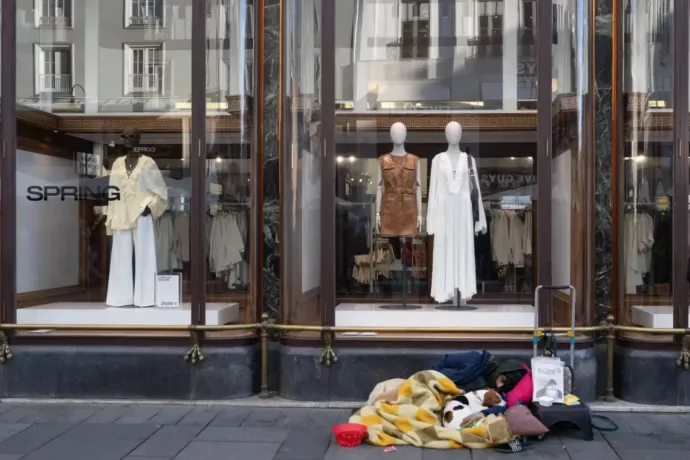
Mariahilfer Straße: the street most Hungarians, myself included, first heard about as children. Before the fall of communism, it was the glittering symbol of the Western market economy, and even today, most Hungarians visiting Vienna make sure they don’t skip it.
However, there are also Hungarians for whom this 1.8-kilometer-long street is a source of livelihood: they sit in front of the neat shop windows and wait for euros to be dropped into their paper cups. Hungarians are the second biggest (after the Slovaks) group among homeless people from the EU in Austria. Most have come in search of a better life, but somehow ended up in the streets. What are the reasons behind this? Do they have a chance for a better future, and how did they end up in Vienna in the first place? We spent several weeks talking to them and about them – for the latter, we contacted the Austrian organizations that provide them with assistance.
I haven't got a house or anything else at home, so why should I go back?
Some of them are holding up signs written in broken German, others just sit and silently wait, while yet others gather in groups. I address one such group in Hungarian on an early summer day, but I'm out of luck: they don't understand me, and one of the women asks me to switch to German. I ask her if she knows where the Hungarians are, and she points to two or three bigger department stores nearby.
Along the 1.8-kilometer stretch, I greet about two dozen people with "Jó napot!" and more than half of them return my greeting.
One of them is a middle-aged man, András. He is sitting next to a paper shopping bag across from one of the aforementioned department stores. When I speak to him, he readily engages in conversation: "I'm a Gypsy, I was driven out of everywhere in Hungary, that's why I'm here. I've been living on the streets since 1990. I ended up there when I was 20, after my mother died in 1989. I've never been married, I don't have any children. At one point I ended up in prison in Hungary, then I came out with nothing. I'm now 55 and haven't been in prison since I was 39. I've been homeless ever since. I'm not saying it's great, it's closer to bad, but without help, it's impossible to get out of this vicious cycle, he says in one breath. It turns out that he knows some German because he used to work as a cook in Austria: back in the day, the Yugoslav club was not far from where we are talking, at the beginning of Mariahilfer Straße. He worked there as a cook and shared accommodation with Romanians.
"I've only been here for four or five days now, but someone swiped all my documents and money. Since the middle of last month, I've only slept in a bed once; I've been sleeping on the street since then." He says he only wants to survive, and most of all, he wants to get back to western Hungary to collect his pension, and replace his documents. But he fears getting on the train without documents and money. "Now I'm sitting here, waiting, begging. Do you know how much I collected today until 2 p.m.? Two and a half euros. What can one buy with that? A coffee at McDonald's," he says despondently.
A few hundred meters away, at one of the subway stations, a woman around 55 is holding a cardboard sign with carefully drawn black letters. On this unusually cold day, she has wrapped herself in a blanket as she waits for euros. The German text on the sign reads: “Please help, I’m hungry. God. Thank you.” She is reluctant to talk at first, but then she recounts that it was a child who helped her write the text. She says she has been living in Vienna for ten years, and came here from a small town in Transdanubia. She is now determined to stay. "I have no home, there is nothing left, why should I go back?" Her entire life fits into a shopping cart with wheels, which she also uses to build herself a bed at night. She doesn't like going to homeless shelters "because of the drunks," and chooses to sleep in a nearby park instead, where she already has a favorite spot. She answers my questions with reluctance and does not want to be photographed. “Please, don't take my picture, they'll give me even less if I'm featured in the newspaper. I only make a few euros a day as it is, I don't know what's going on with people these days.”
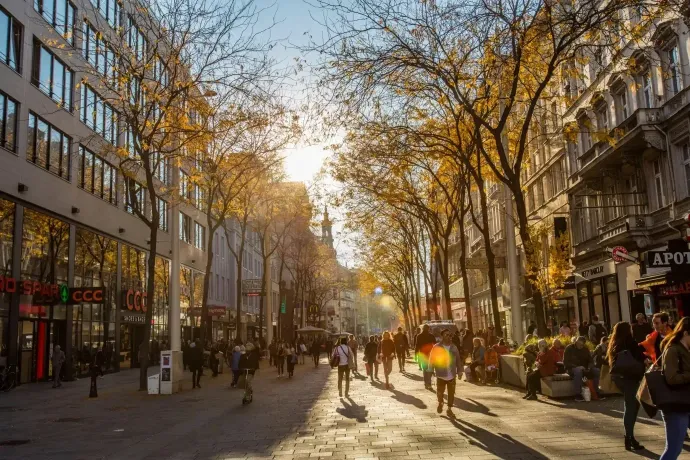
I strike up a conversation with a third Hungarian, a 28-year-old man, near another subway station on Mariahilfer Straße. “I have a little boy, we don’t get much money, and we don’t have anything to eat. I came here to earn money to take back to my family. They don’t give much, but it’s still better than going to Budapest.” I have seen him on Mariahilfer Straße before. He says he is going home to central Hungary in three days. He has been commuting between his village and Vienna for three years. “I usually spend the night in the park. I don’t know where the shelters are. I don’t speak German and I'm not skilled in anything.” I start in the morning, then I go to Gruft (a nearby center run by Caritas (an Austrian charity, where homeless people can get hot meals, among other services) for lunch, then I sit here until 5 or 6, and then go to the park. In winter, I sleep under the eaves where the rain doesn't reach." Besides the well-known shopping street, one may also encounter homeless Hungarians in several other locations, starting in the vicinity of the main railway station, continuing through Karlsplatz, and all the way to Praterstern.
After the Slovaks, Hungarians are the most numerous
In 2024, there were approximately 11,000 homeless and unhoused people registered in Vienna, but aid organizations do not possess fully reliable data. However, based on the so-called "winter package" financed and coordinated by the Vienna Social Fund (Fonds Soziales Wien – FSW), at least some proportional figures can be estimated:
During the winter period, around 18 percent of those staying in homeless shelters are Austrian citizens, while 58 percent come from other EU countries. Slovaks are in first place, followed by Hungarians and Romanians. (In short, Vienna's "winter package" is a humanitarian emergency measure tailored to the cold months, the essence of which is to temporarily increase the number of emergency shelters that are also available to those who are not entitled to social assistance.)
I was interested in finding out why there are so many foreigners – including a significant number of Hungarians – living on the streets of Austria. According to Markus Hollendohner, head of the Obdach- und Wohnungslosenhilfe des Fonds Soziales Wien (Vienna Social Fund for the Homeless), the reasons why homeless foreigners end up in Vienna are complex, but at the same time
“the fact that homelessness is criminalized in neighboring European countries is one of the reasons why homeless or unhoused people decided to change their place of residence.”
It should be noted that living on the streets has been punishable in Hungary since the spring of 2012. In the summer of 2018, Parliament adopted amendments to the Fundamental Law and the Misdemeanors Act, which made living on the streets illegal and punishable by imprisonment throughout the country. Both domestic and international NGOs, as well as the UN's Special Rapporteur on housing rights have spoken out against the amendment. The law is still in force today.
But let's return to Vienna! Austria has a completely different approach to homelessness, which is best illustrated by the fact that there are numerous aid organizations supporting and assisting homeless people in their efforts to reintegrate into society. The Wiener Obdach- und Wohnungslosenhilfe alone is working with more than 30 partner organizations, and the FSW itself is funding a total of 7,000 housing and welfare locations throughout the year, more than 600 of which are in so-called opportunity centers. Here, homeless people are offered particularly low-threshold access to housing and counseling. In addition to Caritas and the FSW, numerous other organizations are active, including Volkshilfe, the Red Cross, the Johanniter, and the Brothers of Mercy.
The figures also attest to the fact that Vienna takes people living on the margins of society seriously: in 2023, there were 12,750 people using the services of Vienna's homeless assistance providers. And last year, the city spent around 142 million euros on this.
There they stand at Hauptbahnhof without any language skills, waiting for someone to come pick them up, but there's nobody coming
Homeless people from EU countries, including Hungary, often end up at the counseling center of one of Vienna's charities helping the homeless, where anyone can seek counsel. We visited one of the organizations' facilities to find out what this looks like in practice.
At the office assisting EU citizens without any legal status, we met a Hungarian advisor (we are not able to disclose their name at the request of the aid organization) who has been working with people coming in for over three years. They and their co-workers provide information in all EU languages on topics ranging from entitlement to residence to minor bureaucratic matters and even on providing help with returning home. Their clients are either walk-ins or arrive at a pre-arranged time. The first time they come in, they talk to them at length about their past, their present, and their options. “Beyond discussing the facts, we also provide emotional support. Often, the most I can do for them is to simply listen.”
"Those coming to us for the first time usually have nothing, in most cases, not even language skills, so we provide services with a very low threshold." We are sitting opposite each other; my seat is usually occupied by the Hungarian-speaking clients of my conversation partner. Based on years of experience, they describe their clients as belonging to one of the following categories:
- migrant workers, who in many cases have a home and even a family, but would like to find work in Vienna;
- poverty migrants: these are people who live in such extreme poverty in their home countries that it is simply impossible for them to stay there, as they have no prospects for the future;
- the chronically homeless: they usually come to Vienna from neighboring countries and have been living on the streets for a very long time;
- the temporarily homeless, who often end up on the streets after falling for fake job offers.
The counselors encounter the latter case quite often: "I have more than one client like this every week. It's interesting that they are almost always promised work on Facebook. In such cases, they travel at their own expense, then end up waiting at Hauptbahnhof without any language skills or familiarity with the place, only to have nobody pick them up. Then they often sleep in a park and usually find out about us within a few days." The aid agency usually helps them by buying them a train ticket home (they can only help with the return journey once, and the rules are strictly enforced).
I ask the counselor to give me another typical example. To protect their clients' privacy, several stories are merged into one: "Someone decides to try their luck and come to Vienna to look for work. They have some basic means of subsistence at home and some general ideas, but these are almost always completely unrealistic—for example, that they won't work for less than €3,000, even though they don't speak any German. In most cases, they are able to find work in construction or the hospitality industry. We don't provide job placement services here, but we tell everyone about Austrian practices and regulations. If they don't find work within the three months available to them under EU regulations, they usually end up staying at the shelter and sooner or later get involved with a crowd where the risk of alcohol or drug addiction may be higher, and from there they start a downward spiral.
So you have a person from a relatively normal background, but once they start their downward spiral, there's a good chance they'll get stuck here. It's very easy to lose one's livelihood quite quickly, and I see a lot of young people like that.
They mention that it is typical that their clients arrive in Vienna thinking that money grows on trees here. But the reality is quite disappointing: if one lacks the necessary documents, one cannot receive financial assistance from aid agencies or the state, as there are certain eligibility requirements. Additionally, the number of low-threshold accommodations available in the summer is significantly lower than in the winter, even though this year the city has increased their number a bit.
Women are just as affected as men: according to the Hungarian advisor's experience, many arrive pregnant in the hope that their baby will automatically receive Austrian citizenship and that the mother will receive high family allowances – neither of which is true. Austrian citizenship is not granted automatically; it is subject to numerous criteria and is a lengthy and difficult process that can drag on for years. The minimum requirement is to have a roof over one's head, and a well-paid job is also a basic criterion. "There is also no provision for the care of the chronically ill homeless, and nursing homes are only available to eligible elderly people," the advisor says, listing some of the misconceptions.
"Being homeless is a huge psychological burden, even for those who have previously lived a normal life. And I have yet to meet a client who hasn't had their phone or money stolen at least once," they say, and András's example at the beginning of the article is a case in point.
The number of Hungarians is not only growing in statisticians' reports, but also on the other side of the counsellor's table:
“There are more Hungarians each year. There are fathers and sons who have been coming for many years, and by now we greet them as old friends.”
In summary, they add that it is impossible to talk about this subject without mentioning Hungary's role in it all: "It is no coincidence that people from Hungary are coming to Austria: politics and society have forgotten about the most disadvantaged groups". In the counselor's view, the responsibility of the Hungarian decision-makers is therefore undeniable. At the same time, they have a great appreciation for the efforts of social workers providing assistance to the homeless in Hungary, and because they are in contact with them, they have some insight into their work: "I can confidently say that they are not behind us even the tiniest bit, either professionally or in terms of their willingness and motivation. They are limited by their means, money, and impossible expectations; these are the things that make their work impossible.”
A warm lunch, a health center, and a veterinarian
Our last stop in Vienna's homeless care system is the Neunerhaus café on Margareten Straße in the 5th district. As we arrive, a woman with a dog steps out onto the café patio with a bowl of tasty-looking risotto, sits down, and starts eating. It's early afternoon, the sun is shining, and there are several people having lunch around her, some alone, others in small groups. In addition to German, several other languages, including Hungarian can be heard.
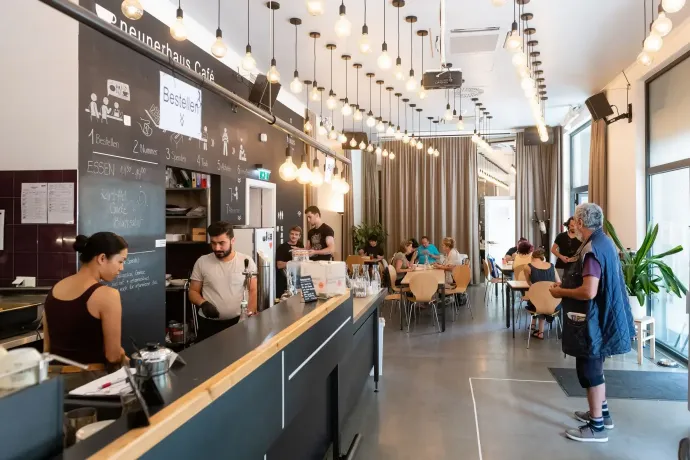
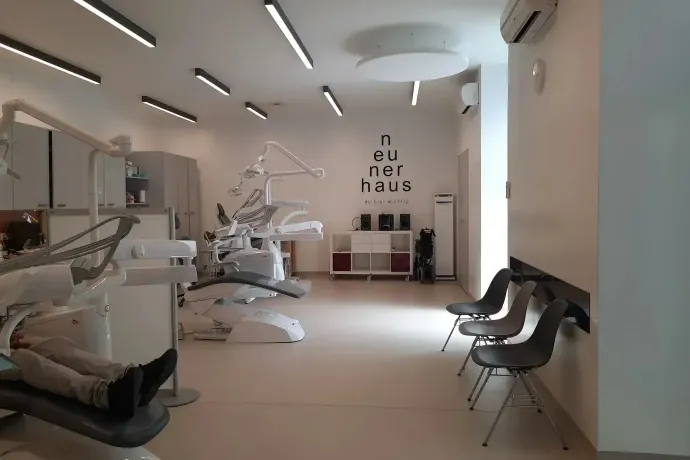
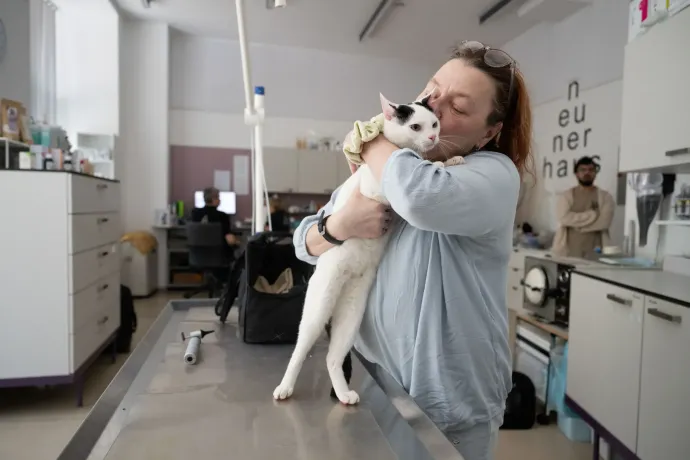
At Neunerhaus Café, as with most of Vienna's assistance organizations, easy access and a low threshold are important in both the literal and figurative sense. The café has been open since 2018 and is open five days a week from 10 a.m. to 3 p.m. In addition to tea and coffee, they serve healthy warm meals at lunchtime to anyone who comes in. Payment is on a donation basis, and it is perfectly acceptable if someone is unable to pay. The importance of this stylish café goes far beyond its basic function. Not only is it a place where many get the only meal for the day, it is also a place where people come to talk about their problems. The Neunerhaus staff are prepared for this, as their employees are multilingual social workers whom anyone can approach or make an appointment with in advance.
Their guiding principle is to treat everyone as equals. The other guiding principle, as one of the staff members puts it, is that “this is an extended living room against loneliness.”
However, Neunerhaus does not only assist people living on the margins of society with food, coffee, and tea: to the right of the entrance is a health center, and to the left is a veterinary clinic. The former provides medical and dental care to those without insurance. The care is comprehensive: social workers are also present, interpreters assist the doctors via video, and it is possible to come in anonymously. They see 6,000 patients on average each year. We look around the interior: any Hungarian public health center could envy its cleanliness and tidiness; the bathrooms are stocked with soap and toilet paper, and the receptionists are calm and friendly.
We walk over to the other side of the café, where volunteer veterinarians hold appointments several times a week. "We provide medical care for your loyal companion. Our services are free of charge, and we will devote our time to your pet," the brief statement on their flier says. We take a look inside, where several veterinarians and assistants are bustling about; an elderly woman has come in with two well-groomed dogs, one of them is watching its companion, whose leg is being examined, with a concerned look. The Neunerhaus veterinary clinic is unique in Austria and, according to the staff, is in high demand. "The owners take very good care of their dogs, often caring for them better than they care for themselves," one of the staff members explains.
"Animals are often the only supportive relationship a homeless person has,"
managing director of Neunerhaus, Elisabeth Hammer, adds. “Animals give people strength in situations that demand a lot of it, and we want to support anything that strengthens homeless people.”
I haven't slept on the streets in Vienna yet, but I have wandered the streets all night
I strike up a conversation in Hungarian with 19-year-old Alexandra on the café terrace. "People are nice here, they start the day with good intentions," she says. "I like sitting here, there are both homeless and non-homeless people who come here." Alexandra looks like any other young girl from any big European city: she looks neat, wears cool sneakers and jeans and a branded T-shirt – except that in the evenings she doesn't go home to her family or a rented apartment, but to one of Caritas' shelters, where she is one of the lucky ones because she has a room to herself. Her example confirms what experts say:
homelessness – especially among women – is often invisible.
When I cautiously ask about her life, I learn that although she was born in Vienna, she lived with her mother in Slovakia and then grew up in a children's home. She says that she experienced more hardship in the first 19 years of her life than most people do in a lifetime. “I've had a lot of negative experiences, but I'm trying to turn them into something good.”
When she arrived in Vienna almost a year ago, she initially stayed with a friend. And as for why she returned to the town of her birth, she says: "It was fate. I hadn't thought about what would happen in a month. Since I've been in Vienna, I’ve never had to sleep on the street, but it has happened that I spent the whole night wandering around the streets because I had nowhere to go. They told me to go to Caritas, so I went there. I spent a few months at the Chancen Haus (a so-called "house of opportunities" for young adults, which is more than just a homeless shelter because residents can stay in their rooms 24 hours a day for up to 3-6 months). They gave me a new chance at life there. I get much more help here than I did in Slovakia. The best thing that has happened to me in Vienna is that I have a roof over my head. I have sometimes been lazy, I still have some growing up to do when it comes to work, I have lost my job six times since I have been here.”
She takes a sip of her coffee and continues with a serious look on her face: "I don't want to freeload off the welfare system here, but once someone falls to the bottom, it's very difficult to get out. And it's even harder if you're alone, you’re like a puppy on the side of the street." She says that she doesn't drink alcohol, but "sometimes the devil tempts her" to buy things she doesn't really need. She works as a cleaner in a retirement home, and when she's not working, she likes to be around animals and go walking in a park. And as for her plans? “I'd like to find a place to rent and study psychology, but I know I'll have to work really hard to make that happen.”
As right-wing rhetoric gains ground in Europe, the homeless are turned into scapegoats
Alexandra's case of course is not unique. According to Elisabeth Hammer, who heads Neunerhaus, it is common for young people from youth welfare institutions to choose Vienna as their destination. "And we often meet people from other marginalized groups, such as LGBTQI+ people. They seek refuge here after being stigmatized, marginalized, or criminalized in their home countries. They arrive in Austria and are once again excluded, so we want to be their voice." Along with many experts, Elisabeth Hammer believes that the issue of homelessness should be addressed where it arises. “In Austria, for example, there should be counseling centers, assistance, and housing for people who become homeless in rural areas. After all, that's where their families, friends, and social networks are.”
According to the 2021 Lisbon Declaration, homelessness should be eliminated in the EU by 2030, which all the experts I interviewed consider unrealistic. Elisabeth Hammer believes that the growing tendency of how homelessness is being spoken about across Europe is problematic in itself: "There is a growing trend in public discourse towards viewing homeless people as a security risk and city dwellers not wanting to see poverty in public spaces. As right-wing rhetoric gains ground in Europe, homeless people are increasingly being portrayed as scapegoats. This is very concerning.”
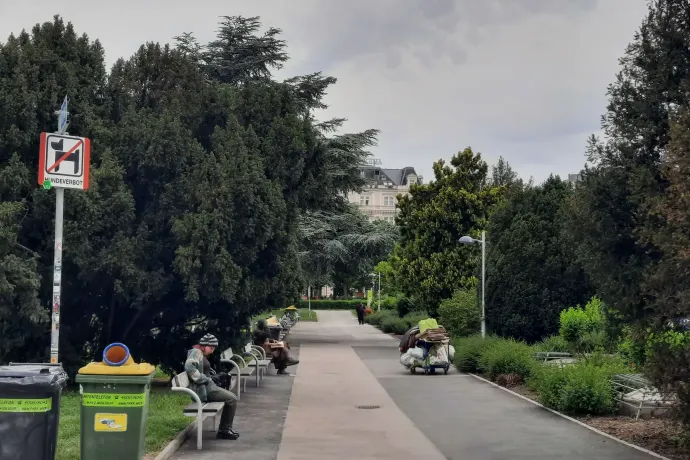
As she says, Vienna is no exception, and such voices tend to grow louder before elections.
"Living on the street is indeed a safety risk, but only for the homeless person. Homeless people are more vulnerable to violent attacks and hate crimes in general."
At the same time, all things considered, the services Vienna offers to homeless people are exceptionally good by European standards. "I am glad that we are part of this, but there is still a lot to be done, especially in terms of supporting homeless people and ensuring that we have accurate data," she concludes.
It wasn't yesterday that Austria started tackling this problem; they've been trying to improve the situation of homeless people for decades. "But a city of two million like Vienna can't achieve this goal on its own," says Markus Hollendohner, quoted at the beginning of the article, who believes that greater European cooperation could provide a solution.
The names of our homeless interviewees have been changed to preserve their human dignity.
For more quick, accurate and impartial news from and about Hungary, subscribe to the Telex English newsletter!